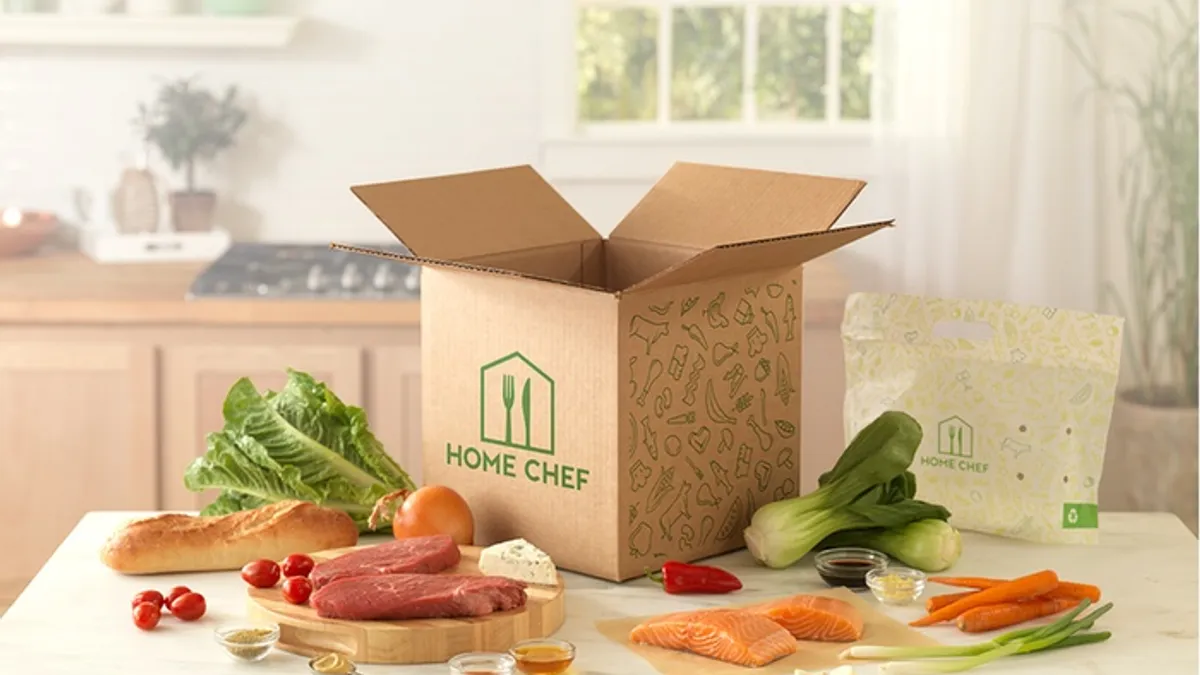Dive Brief:
- Kroger’s recent investments in e-commerce provider Ocado and in meal kit maker Home Chef underscore an increasingly important fact in food retail: Supermarket chains have to effectively adopt technology in order to survive. This according to Tech HQ, a British technology and business publication, which says the deals should help Kroger stay competitive with top players in the industry.
- Last week, Kroger bought meal kit maker Home Chef for $200 million plus an additional $500 million in possible incentives. The company will add its popular meal kits to Kroger stores and will continue operating its profitable subscription service. It will also offer data-gathering capabilities that should complement Kroger’s own abilities here, sources note.
- Kroger’s partnership with Ocado will bring the e-grocer’s automated warehouses to the U.S. in an exclusive fulfillment deal with the chain. The deal, estimated to be worth $247 million, promises efficiency and cost savings — and ultimately, profitability — over time.
Dive Insight:
Kroger is one of the most tech-savvy retailers in the country. It operates its own data science arm, has been a leader in app development, and will soon introduce digital shelves in stores. The company has developed so much proprietary technology over the years, it recently started its own commercial venture that will license some of its innovations out to other retailers.
But even Kroger knows it needs tech help in crucial fields like e-commerce and meal kits.
As Tech HQ points out, the company’s partnership with Ocado underscores the importance of efficiency and cost savings in online grocery fulfillment. Kroger’s investment — estimated to be around $247 million — will take a long time to come to fruition, with each of Ocado’s warehouses taking around two to three years to build. But over time, the e-grocer’s automated systems, which grow increasingly efficient through machine learning, promise savings over the traditional store-fulfillment method, and ultimately, profitability.
Ocado’s fulfillment structure may also help Kroger reach parts of the country where it doesn’t have a presence — in places like Florida and in the northeast.
“We would have the expectation that these sheds will turn up in areas where we don’t have brick-and-mortar today, where the population may be more dense and home delivery is a bigger piece of the business and a way to get in business in parts of the country where we aren’t today,” Kroger’s chief financial officer Mike Schlotman said during a presentation at BMO Capital Markets’ Farm to Market investors conference last week.
Meanwhile, with meal kit maker Home Chef soon to be in its arsenal, Kroger gains data-gathering abilities that can complement its already impressive abilities here. Although meal kit companies are primarily known for culinary innovation, they’re also incredibly savvy at online marketing, web development and data science. In an interview with Food Dive last year, Plated CEO Josh Hix compared meal kit makers like his to technology startups.
“There’s a tremendous amount of data science that goes into understanding consumers — profiling their tastes, building recipes based on those tastes, and then doing it all in an efficient way, without much food waste,” he said. “Those are all competencies that a technology company might have, and that’s just not in the DNA of retailers of any kind.”
Kroger’s deals also prove the growing importance of specialization in the food industry. Grocers are used to doing it all and being the on-stop shop, but in this competitive environment, with Amazon and Walmart breathing down their neck, they have to be the best at everything that’s important — or find someone that can do it better.








